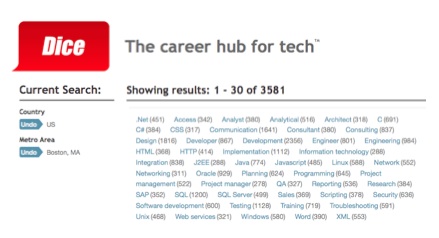Today, there are 3,613 tech jobs open in the Boston Metro area, 32 more than yesterday, when the White House Business Council huddled with local tech companies to figure out how to meet the challenge of finding qualified individuals to fill these jobs.
Execs from Ember, Akiban, Prelert, Kiva Systems, GenArts, GnuBIO, Buzzient and a dozen other of Boston’s leading startup businesses met at UMass Boston’s Venture Development Center with U.S. Department of Labor’s Assistant Secretary of Employment and Training, Jane Oates and Joanne Goldstein, Secretary, Massachusetts Labor and Workforce Development. The meeting is part of the White House Business Council’s round-table series to communicate with businesses to “improve America’s competitiveness.”
Tech job openings in the Boston area are up 19 percent compared to a year ago, suggesting a shortage of talent coming out of colleges and universities. Massachusetts ranks fifth on a list of “shortage states,” which are not producing enough tech graduates to fill job openings, according to Dice’s America’s Tech Talent Crunch. The shortage is creating a serious pipeline problem for business.
The roundtable discussed specific “middle skills” required for their open positions, and how the tech industry can work with colleges and universities to prepare students with these skills. Workers need a broader overall skill set that encompasses technology and business knowledge.
In the short term, though, tech execs want the H1b visa cap raised. In 2010 alone, 44% of the 5,623 H1b visas issued to companies in Greater Boston were for information technology occupations.
In the closed, “off the record” meeting, the companies each candidly shared the other ways they are coping with the talent shortage, such as relying on each other for referrals and retraining talent in related fields.
Strikingly, none of these ways involve relying on government training programs. Oates and Goldstein pointed to many programs which larger companies are using that might help, but acknowledged the difficulty communicating with a tech startup industry as diverse as the one participating in the meeting.
The participants urged the government to create a new service that matches skills of those being downsized from larger tech companies (e.g., Boston Scientific, Cisco, etc.) and startup companies adding jobs. Oates committed the White House Business Council to work through the Venture Development Center on meeting follow-up.
The Venture Development Center is Boston’s leading startup incubator for technology and life science companies.
